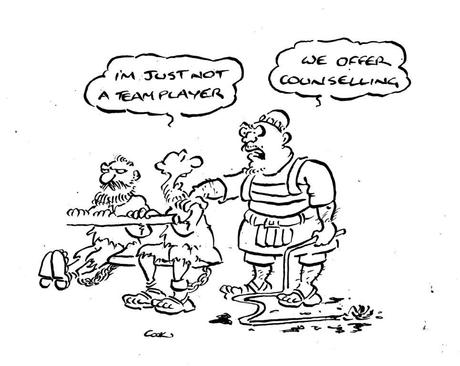

 Focus on the problem, not the person
Focus on the problem, not the person

Difficult employees are hard to deal with. Some have niggling issues for which no solution seems apparent. Management is slow to react. The situation festers. The politics around it grow complicated.
In most jurisdictions there are clear-cut rules for dismissible offences. More challenging are people who are simply ‘difficult’. They may be chronically late, disrupt team efforts, indulge in excessive politics, be rude and aggressive, or passive and non-compliant.
There is a line beyond which certain behavior is not only unacceptable but downright destructive. The good news is that as a manager you intuitively know where the line is. The bad news is twofold. One, you have to do something about it. Two, you have to objectively define the problem.
You must act.

Set aside some quiet time to assess the behavior. Think of concrete examples of the impact of the behavior. In each case define:
- the action (eg, the person is persistently late)
- the impact (you can’t demand co-workers be on time when someone is chronically late without penalty. It erodes productivity and morale).
- your responsibility: managing productivity and morale
Do it calmly. Make it a statement of fact, not emotion. Focus on 3. That’s your job. Be clear about it.
Another simple example: being rude to customers (the action) loses business (the impact). You are responsible for maintaining customer loyalty. Stick to that commercial fact. You are not a counselor or a therapist. You have to take action to maintain customer loyalty.
Follow a process.
Arrange a session. Be clear you want to discuss a management issue, not a personal problem. There is no foolproof formula but the following will help:

- Make an undertaking to yourself that you will remain calm and stick to the facts.
- State your role. You are responsible for matters that affect the business. Then clearly state the issue: ‘When you ..., the impact is ...’.
- Ask for input: ‘I have to manage this. What do you think I should do?’ Don’t judge the conversation. Just listen. Stick to the fact this is a problem. Feelings, either yours or the employee’s, need not enter into it.
- Call time-out if the discussion becomes difficult or reaches a stalemate but stay firm that it must be addressed, and will be, by a fixed date.
- Be supportive. Even difficult people can see why a resolution may benefit the business. You may be able to support the solution — anything from speaking to other employees to lifting the skill set of the person in question. Work out what actions will be taken, by whom and by when, and put them in writing.
- You may choose to make this a formal warning. If you think it’s necessary, make this clear and make a precise note of it.
- Close on a positive. Thank them for their input and tell them you are looking forward to managing it in the agreed manner.
Some people are completely inflexible, or subject to chronic relapses. By doing this process, you have provided an opportunity. They may or may not choose to take it. If not, you will have to choose your next step. But having established a dialogue, future sessions will be easier, not harder.
The issue is now clear.
You are managing it.

